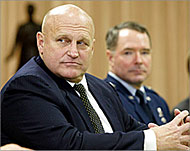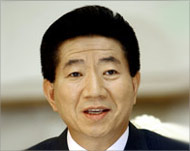US not for NKorea regime change
US Deputy Secretary of State Richard Armitage dismissed on Friday suggestions that Washington had plans to push for a regime change in North Korea, but said there was no quick solution to the nuclear issue.
 |
| Armitage: China is an excellent partner |
Armitage’s comments came in an interview with Radio Free Asia.
Asked on whether the United States was interested in toppling North Korea’s leader Kim Jong-Il, Armitage said, “No.”
“The desired goal is a government in Pyongyang that eschews the possession of nuclear weapons – that is, a de-nuclearised peninsula”, he said.
The US deputy secretary of state praised China for its cooperation on North Korea’s nuclear issue, but was cautious in assessing Russia’s input.
“We’ve found China to be an excellent partner, Russia becoming a much better partner, and we’ll continue the search for a peaceful solution”.
Armitage’s remarks came as delegates from China, Japan, and South Korea had arrived in Washington to meet this week to discuss what steps to take next on Pyongyang’s nuclear issue.
China and Russia blocked a US attempt to have the UN Security Council denounce North Korea’s nuclear drive.
Armtage said that Beijing and Moscow had “some concerns” about the resolution.
He said that Washington was interested in “trying to resolve these issues in multi-lateral forums like the United Nations.”
Armitage added that the United States was taking into consideration the views of others, including China and Russia.
Moo-hyun visits China
Diplomatic efforts to ease the nuclear standoff continues as South Korean President Roh Moo-Hyun is due to visit China next week to discuss with his Chinese counterpart, Hu Jintao, Pyongyang’s nuclear drive.
 |
| Moo-hyun will call on China to take a more active role |
Moo-hyun’s visit comes as China has openly said it is making efforts to solve the festering security crisis in the region.
“Moo-Hyun’s office said that the South Korean president would “call on China to take a more active role in settling the nuclear issue”.
Moo-hyun is expected to also discuss with China’s President Hu Jintao trade ties that have increased to $40 billion from almost nothing since Seoul and Beijing normalized relations a decade ago.
As diplomatic efforts to solve the nuclear issue continued, Washington maintained its massive pressure on Pyongyang.
The Washington Times reported on Friday that the Central Intelligence Agency (CIA) believed North Korea was reprocessing spent nuclear-fuel rods into plutonium.
The newspaper cited unnamed US officials, who said reprocessing 8,000 stored nuclear fuel rods would be a key indicator that Pyongyang was not abiding by commitments to freeze its nuclear programme.
Meanwhile, 21 North Koreans arrived in Seoul on Friday in two separate groups after fleeing their hunger-stricken country, officials said.
One group included only two men in their 40s, who crossed the western sea border in a boat, according to the office of the joint chief of staff.
A second group consisted five men and 14 women, who flew to Incheon International Airport via Manila after seeking refuge at South Korean diplomatic missions in China.